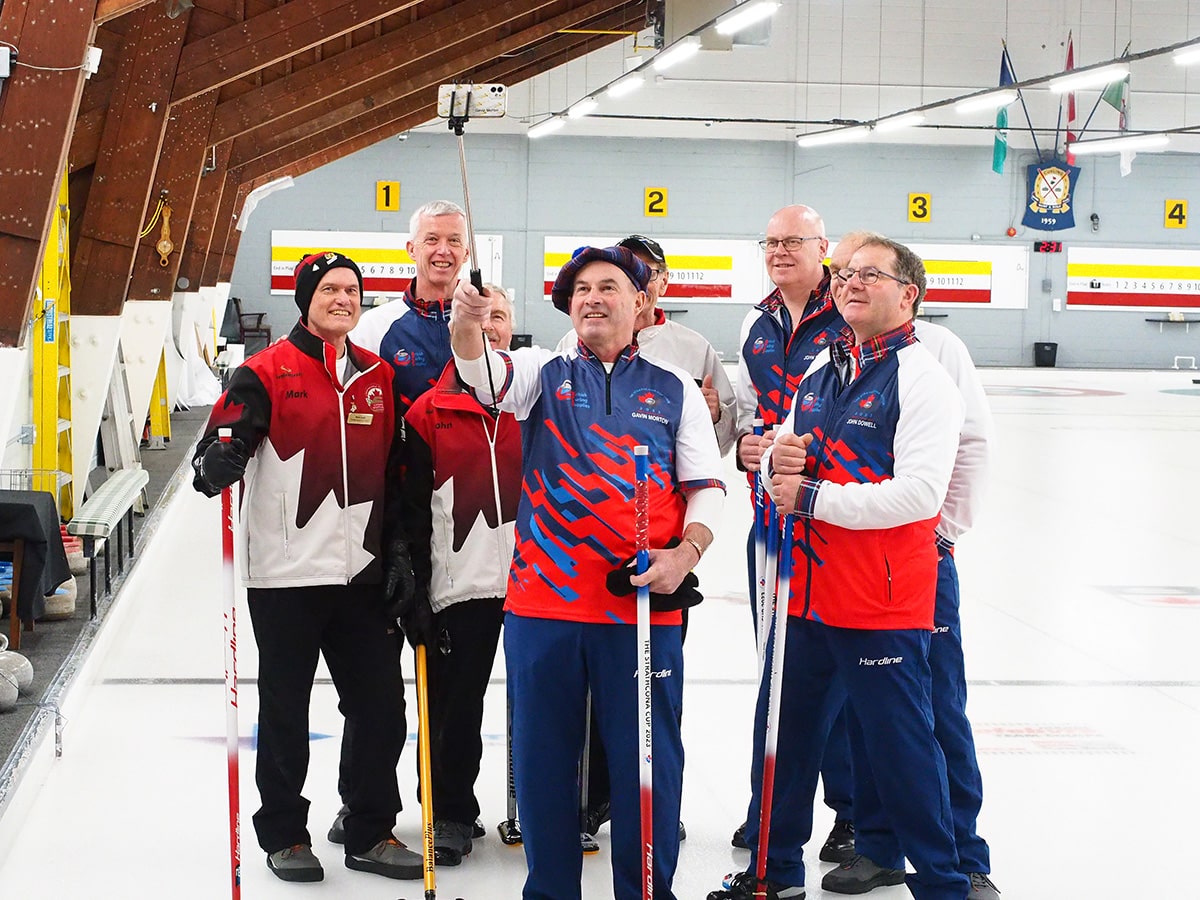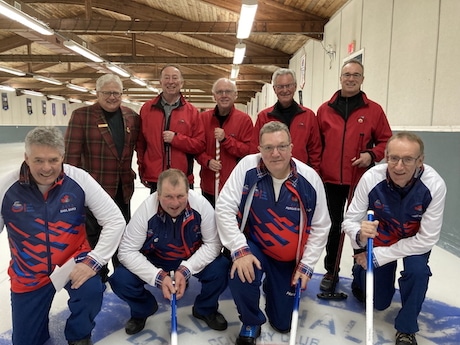120 Years of History!

Historic 2023 Strathcona Cup comes to a close in Canada
The Strathcona Cup is an age-old tradition that has withstood the tests of time. The international competition between two of the most storied curling nations in the world – Canada and Scotland – dates back 120 years.
This year, Canadian curling communities hosted 60 Scottish curlers over 22 days for a series of friendly competitive games. The Scottish contingent was divided into three teams touring across the country – West, Central and East – for a curling visit across all 10 provinces and 84 curling clubs. The teams played 95 draws of curling, with roughly 360 games played between Canada and Scotland.
Last Thursday, the festivities wrapped up at the Ottawa Hunt and Golf Club with a closing banquet and a winning nation determined based on the scores of all games played across the tour.
Canadian curlers will travel to Scotland five years from now for the next Strathcona Cup, which the Scottish contingency will host. This event occurs about every five years.
For those keeping scores, Canada did win the 2023 Strathcona Cup by a 2454-2317 total score (+137 point margin).
But Newfoundland and Labrador’s Toby McDonald, participating in this third Strathcona Cup, doesn’t believe there is any final score that overshadows the importance of this prestigious event.
He’s represented his province and country at numerous national and international events worldwide. Now, as he reaches the twilight of his career, he’s taken his love and appreciation for the sport back to its roots through the Strathcona Cup.
“It’s such an event. It’s quite a historical and important event in curling. Over a century long and the competition and camaraderie that comes out of it is wonderful,” said the 1976 Brier champion, McDonald. “You make lifelong friends and it’s really the way curling should be. You go out, compete, then come back in to sit down, chat, and make new friends. Then you go out, compete again, and repeat that for 22 days.”

McDonald played third for the first Newfoundland and Labrador team to win the Canadian men’s championship. It was the province’s only Brier victory until Brad Gushue won his first title in 2017. McDonald also played a prominent role at the start of Gushue’s career. During Gushue’s memorable run to a gold medal at the 2006 Olympic Winter Games, McDonald was the team’s coach.
Having all those experiences, the prominence and importance of the Strathcona Cup hold equal significance in McDonald’s eyes.
“I’ve been fortunate enough to compete at a bunch of levels of curling over the course of time. I’ve played at a Canada Winter Games, the juniors, the men’s, the senior men’s, the master’s and now the Strathcona Cup,” McDonald said. “All of them were wonderful, but at this juncture, I’m realizing the importance of the Strathcona Cup to curling.”
It takes significant coordination and teamwork to keep an event of this stature for 120 years. It has withstood World War I, World War II and the Covid-19 pandemic. The event started as a two-month tour with competitors taking ships across the Atlantic Ocean to compete. While technology has advanced (Zoom meetings were particularly helpful to coordinate over the past few years), Canadian contingent team captain John Shea says it has taken the work of countless people in Canada and Scotland to organize the event that has historical ties to Curling Canada and the Royal Caledonian Curling Club in Scotland.
The event is named after Donald Smith, 1st Baron Strathcona and Mount Royal. Smith, a Scottish-born Canadian, has served as the ideal conduit between the two countries. The businessman and philanthropist served in various roles with the Bank of Montreal, Hudson’s Bay Company, McGill and Aberdeen Universities, the Canadian Pacific Railway and at federal and provincial levels of government. He also donated the championship trophy for this curling event, one of the world’s longest-running international sporting competitions. The Strathcona Cup, for example, has a more extended history than golf’s Ryder Cup.
“This man lived nine lives in his 93-year-old life,” Shea said. “He donated this cup, and today, basically 110 years later, this event keeps going,”
As part of the event, local curling facilities host the tourists and welcome them with ceremonies and customs unique to their regions.
In Newfoundland & Labrador, a leg of the tour that McDonald played a hand in organizing, Scottish curlers were “piped” in by traditional Newfoundland & Labrador fiddlers Billy Sutton and Patrick Moran. In Toronto, the CN Centre was lit in red, white and blue to honour the Scottish guests. In Prescott, Ont., the Prescott Curling Club hosted an event for 300 people, including the area’s member of parliament and mayor, which featured an outdoor curling little rocks event.
No matter where a Scottish curler is across the country, they are getting a unique Strathcona Cup experience that only the entire country can provide from coast-to-coast.
When McDonald was in Scotland during the 2018 Strathcona Cup, he remembers meeting a young group of Scottish curlers who came to the rink to greet the Canadians. It happened to be a young Team Bruce Mouat, the unit that would go on to represent Scotland at numerous world men’s championships and earn silver at the 2022 Olympic Winter Games.
In 2023, young Newfoundland & Labrador curlers extended the same courtesy to the Scottish. Nathan Young, soon to be a two-time Tim Hortons Brier competitor at the ripe age of 20, and Nicholas Codner, the youngest person to ever throw a rock at the Tim Hortons Brier at the age of 15, were on hand to greet the curlers.
It exemplifies curling’s past, present and future in synergy. How the camaraderie and values of the game are the same whether it’s 1923 or 2023.
The hope is that a historic and storied event such as the Strathcona Cup will continue to be a monumental achievement in the careers of curlers of all aspirations and all generations.
“Hopefully, it’s around for another 100 years,” McDonald said.




